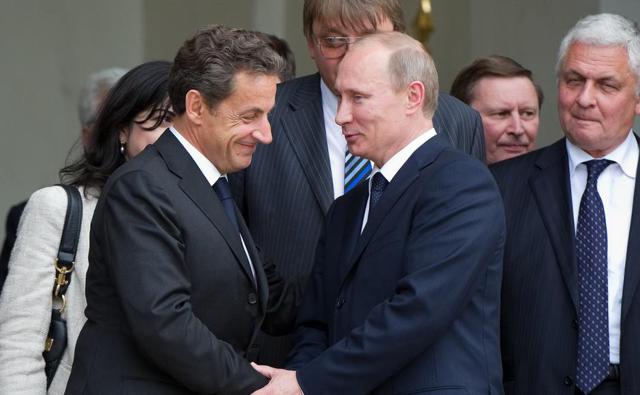 Construction of a new Russian Orthodox Church in central Paris is imminent. The church, which will have five golden domes, will decorate Paris's skyline along with other architectural gems such as the famed Eiffel Tower, which is a short distance away from the proposed construction site of the church.
Construction of a new Russian Orthodox Church in central Paris is imminent. The church, which will have five golden domes, will decorate Paris's skyline along with other architectural gems such as the famed Eiffel Tower, which is a short distance away from the proposed construction site of the church.
The church, which is yet to be named, will be built on a parcel of land sold to Russia in 2010 for $99 million under a deal signed by former Russian president, and incumbent Prime Minster, Dmitry Medvedev, and former French President Nicolas Sarkozy.
Francois Hollande, the current French President, has given clear signs that his administration will follow through on the deal, despite increasingly frosty relations between Russia and Western nations, who France are allied to. "The deal is done, Russia is the owner of that land," remarked, Eric Woerth, who was the budget minister to the former French President Sarkozy, as quoted on Bloomberg.
Scrutiny
While the decision to green light Russia's construction of a church in the heart of Paris is not controversial when viewed in its limited context, France's past actions with matters related to Russia have made this decision to come under increasing scrutiny.
France recently went ahead with the sale of two warships to Russia, despite Western allies such as the U.S., who strongly disagree with Russia's incursions into Ukraine, advising against the sale. U.S. President, Barack Obama previously criticized France on the warship deal, saying that France was inking critical defense deals with Russia at a time when the latter had undermined international law and infringed on the sovereignty of its neighbors (referencing to the annexing of Crimea).
As France continues to deepen its relations with Russia, it is likely that its actions will foment increased criticism from its Western allies, who are strongly opposed to Russia's position on Ukraine. Moreover, Russia recently cut gas supplies to Ukraine after talks over unpaid bills foundered. In a separate move, new Ukrainian President, Petro Poroshenko, intensified political tough talk and said that Ukrainian troops needed to regain control of the Russian-Ukrainian border, adding that the condition was a prerequisite for cease fire and consequent peace talks. If the political rhetoric between Russia and Ukraine carries on in this troubling trend, it is highly likely that extended positive relations between France and Russia will serve to irk France's Western allies, including the U.S.
Necessary Relationship
Despite the costs, politically, that France has to pay for deepened relations with Russia, it has no choice, at least from where it currently stands. France's economy is doing unreassuringly bad with little to no growth in the past two years. Russia has proven to be a favorable market for its products and trade data indicates that France's exports to Russia have increased tremendously since 2000, approximately fourfold, as argued on Bloomberg.
Based on the economic ties, France's relationship with Russia is unlikely to falter, despite France's allegiance to Western nations and its implied agreement to the Western position on Russia's incursion into Ukraine. This means that if things get worse in Ukraine, France's relationship with Russia will come under even more scrutiny from the West. For France, however, this is not the first-and perhaps not the last time-that it is experiencing diplomatic rows. Nicolas Sarkozy, the former French President, and as earlier mentioned the man who inked the Church deal with Russia in 2010, previously called Israeli Prime Minister Benjamin Netanyahu a liar in a private conversation with Barack Obama at a G2 meeting in 2011. The remarks were picked up by a microphone the two thought had been switched off, but was on. Because of the context of things and Obama's response, Sarkozy's remarks on Netanyahu set off a diplomatic nightmare for U.S-allied France and in extension the U.S. Despite Israel being an unwavering ally of the U.S., Obama's response to Sarkozy, which was 'you're sick of him, but I have to deal with him everyday', implied an agreement of sorts with Sarkozy's statements. As expected, this did not play well for the U.S. and France, signaling that France has before been in the hot seat as far as diplomatic rows and international relations go.
Disclosure: The author has no positions in any stocks mentioned, and no plans to initiate any positions within the next 72 hours.